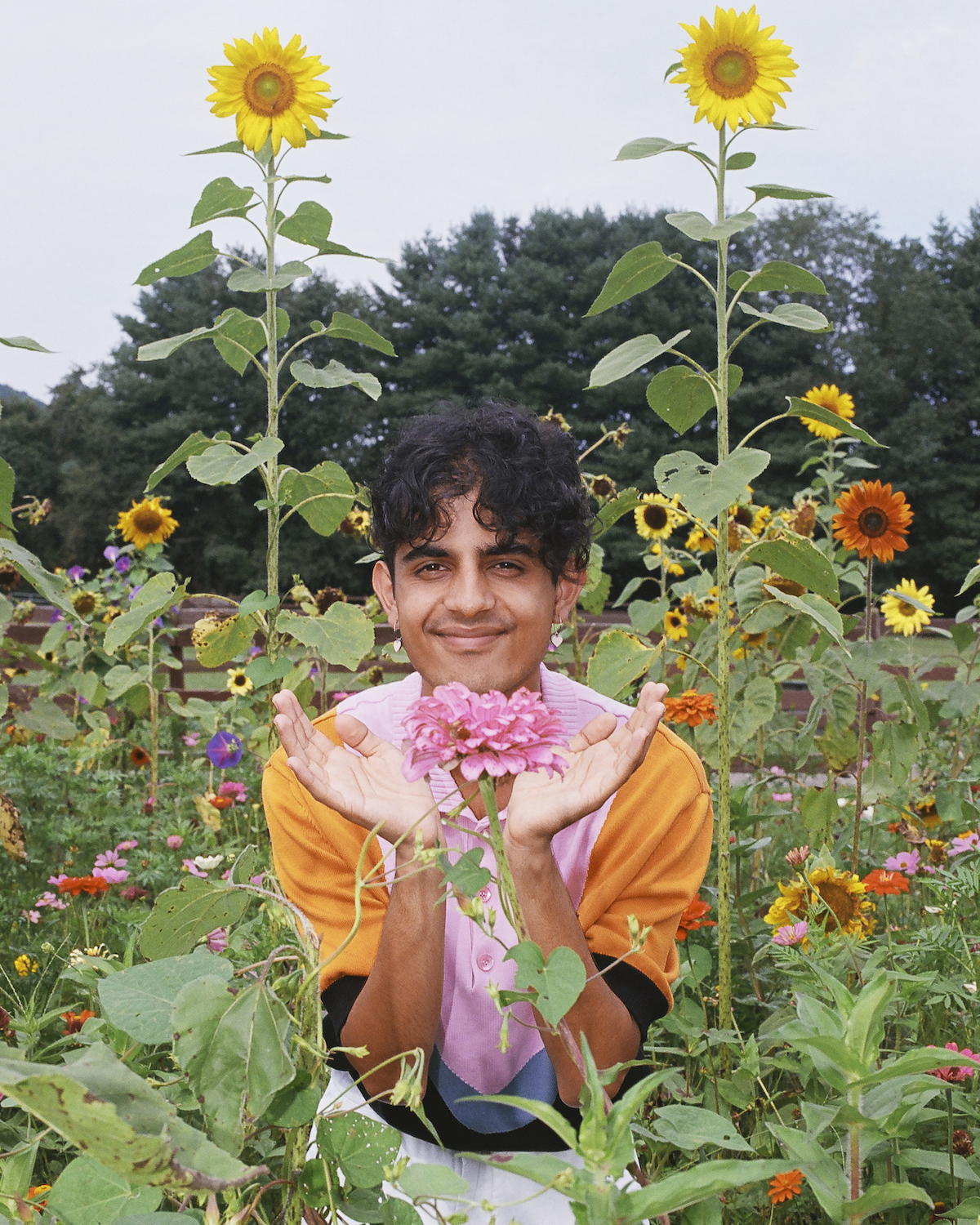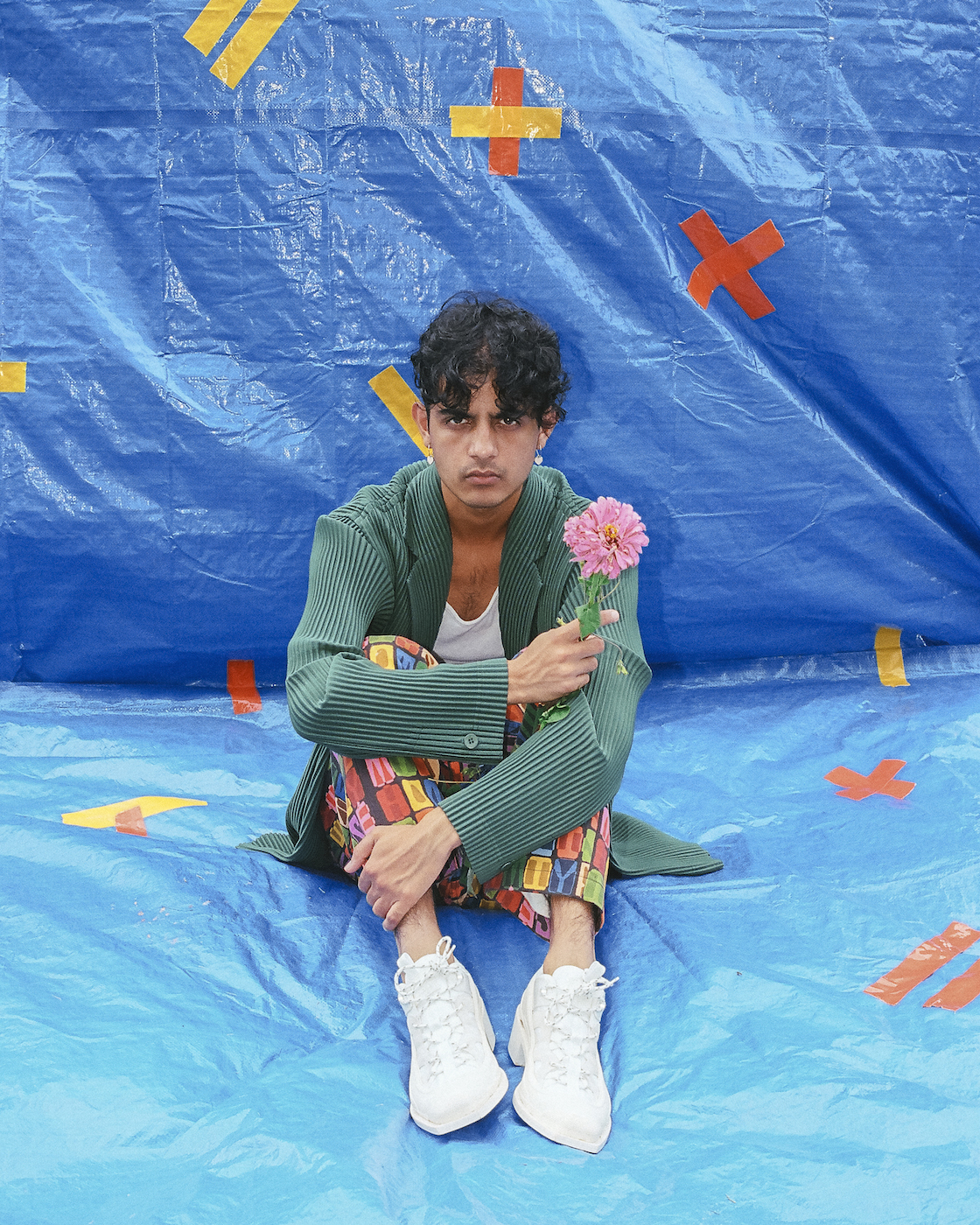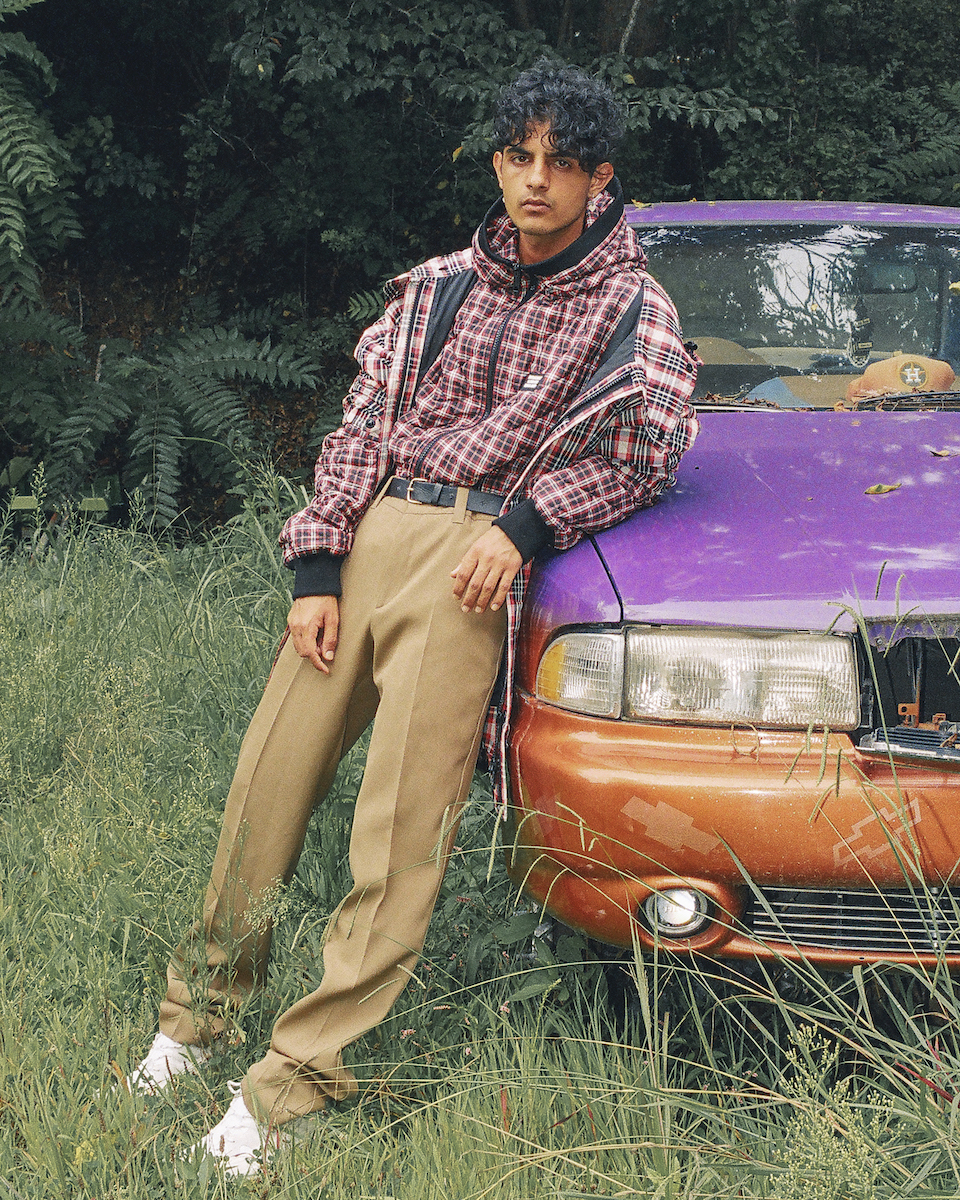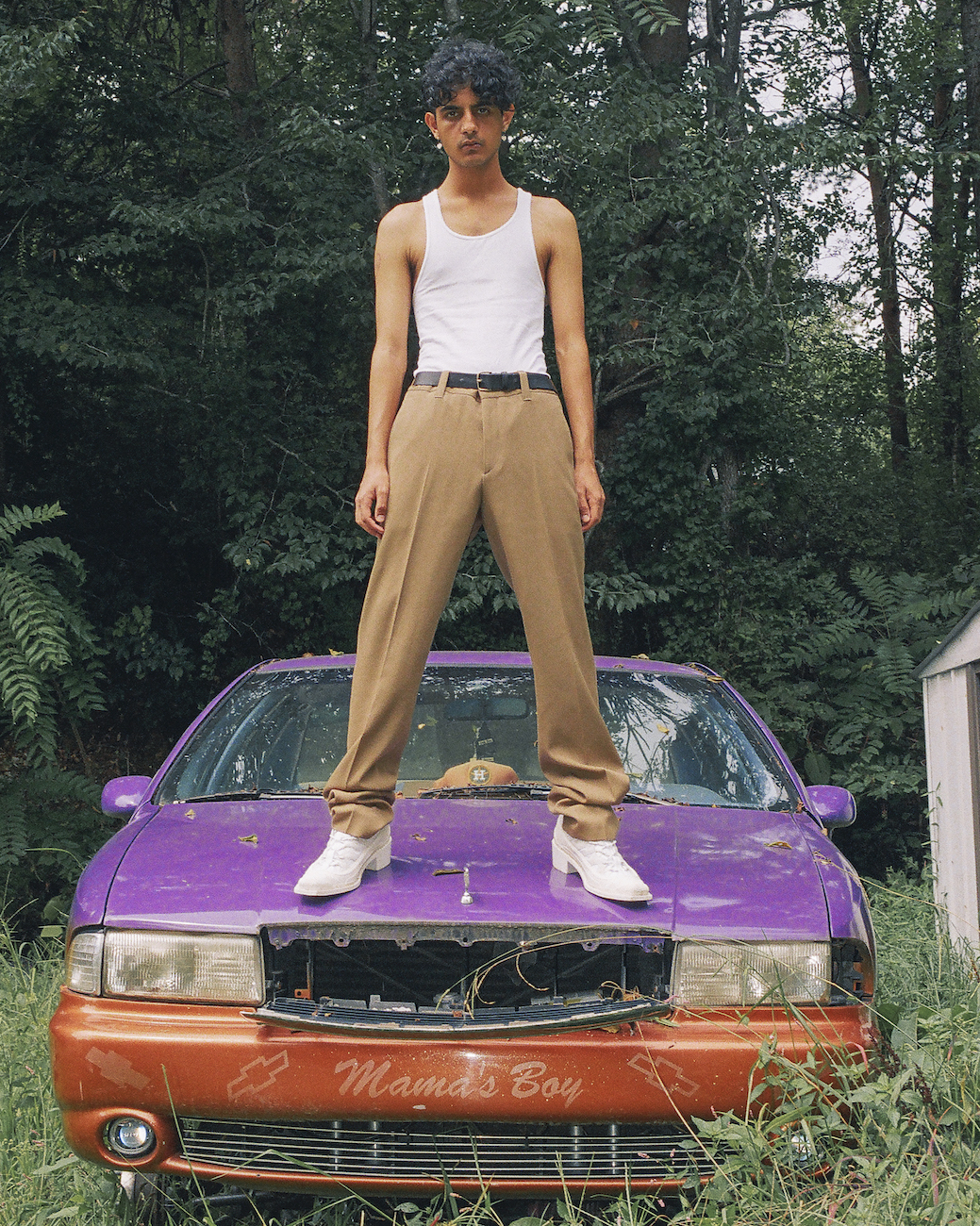From “Burden” to Blissful, Healthy and Happy: 2020 Breakout Star Curtis Waters’ Debut Album Pity Party Is a Blast
“Good job, Curtis!”

That simple, three-word pat on the back, delivered in a cartoonishly sweet voice, has long been a signature touch of Curtis Waters’ music, dropped into the intro of every song he’s recorded, dating back to “My Ex-Girlfriend Turned Into the Moon,” a goofy, lo-fi declaration of love from 2017 that marked his first release as an artist. This week, more than three years later, as it appears on each track on Pity Party, the debut album from one of 2020’s breakout artists, “Good job, Curtis!” is an understatement.
We are here, of course, because of “Stunnin’” – the slinky, louche, irresistible two and a half minutes of rapped-sung hip-hop-pop that, with the help of some expert promo on TikTok and a cheeky, green-screened video shot in a North Carolina garage, captured the attention of a world in lockdown this past spring, and finally kicked down the door of the music world for a 20-year old producer, singer and songwriter who had begun to wonder if it was ever going to open for him. Hundreds of millions of streams later, “Stunnin’” is a chart phenomenon, and it allowed Curtis Waters to quickly show the globe how much more he had up his eclectic, DIY sleeve.
A succession of singles and videos throughout the summer sounded nothing like “Stunnin’” but were each compelling in their own right, and only added to his allure: “SYSTEM” (pissed-off, anti-capitalist and anti-racist electropunk); “The feelings tend to stay the same” (wistful, nostalgic indie-pop); and “Freckles” (bright and hopeful, with a charming video that casts Curtis as an astronaut having a very chaste flirtation with a blue-skinned local on another planet).

All four singles are included on Pity Party, along with many more sonic turns: spacey and sharp-elbowed hip-hop; sentimental, acoustic guitar-flecked melodies; shimmery and hazy trap; a surf-punk standout; and most notably, tracks that merge quirky beats and dryly funny delivery with lyrics that mine seriously dark chapters of Curtis’ life, involving mental illness, overmedication, busted relationships and frequent feelings of failure. Miserable bliss? Blissful misery? Take your pick – Pity Party is a blast. It’s so addictive, in fact, that by the time “Stunnin’” rolls around at track 12 to wrap up this affecting ride, you’ve all but forgotten about that megahit.
“Someone said to me, ‘Pity Party is like, silly music for sad people.’ Something like that. And I wasn’t even offended,” Curtis recalls over a Zoom call from his home studio in North Carolina, where he’s lived since 2017. “I think it was a hate comment, but I wasn’t even offended. I was like, ‘That’s so dope! I totally agree.’ It was so funny to me, because I think – humor is a big part of what I do, whether intentionally or not, and it kind of seeps in.”
It’s seeped into his music for years, laughs coexisting with angst on the older songs that populate his Soundcloud, including ones on his first, self-released LP, 2018’s Prom Night, – and there is a reason for that dichotomy. Curtis Waters’ story is one of a boy born in Nepal at the end of the last month of the first year of a new millennium as Abhinav Bastakoti. His academic parents, determined to better their lives, moved the family wherever their multiple college degrees could take them – Germany when Curtis was 4, Canada at age 10, and eventually America’s Tar Heel State at 17. In Calgary, his “formative” years were fun and creative, as he discovered a talent for producing and selling beats, but also fraught: feeling at times like the “skinny brown kid” in a school full of white hockey jocks; getting grief from his parents over his pursuit of music and not, say, science or medicine like others in his high-achieving family; and beginning even before his teens, struggles with mental illness. At 16 he was hospitalized and dropped briefly out of school, “got better” and eventually graduated from high school in North Carolina. But his mental health went south again in his freshman year at UNC Greensboro. A bipolar diagnosis led to a medical regimen of no less than six pills a day, which brought on what Curtis calls a “serious system failure” and a withdrawal from college to move back home and heal. It’s been an often rough ride – and yet Curtis managed in late 2019 to turn those troubled times into this new, remarkably positive-sounding LP.
“I think I’m just naturally a pretty upbeat person, and so I think that’s why a lot of the songs come out that way,” he explains, adding that he shies away from songs getting too heavy. “I’ve been making beats for so long that I’ve been inspired by Nintendo and all this stuff, that when I sit down, that’s just the type of stuff that comes out and when I make melodies, they just end up being like, catchy and fun. But then the lyrics, they just end up being what is true to me, I guess.”
His truth is sobering on “Shoe Laces”, which opens the new album. If there’s such a thing as a feel-good track about contemplating suicide, this is it. He’s gone there before, on a moody 2018 song, “Neebu”, whose lyric included, “Tell my mom I won’t make it to the summer.” But here, he brings a lighter musical touch. Identifying as the “shame of the family”, Curtis declares to a bouncing melody, “I need to make a change/ From tying my shoes to tying a noose/ Too many choices/ Which should I choose?” If that all sounds grim, the glitchy jazz-pop song is anything but. “I’d say it’s almost sarcastic, or maybe tongue-in-cheek,” he explains. “Cause the beats are so pretty and jazzy and cartoon-y. We’re editing the video for that right now, which is gonna be so cool. It’s a children’s like, Blue’s Clues-themed? But I am depressed in it and I have a noose. I don’t know, I’ve always been a big fan of contrasting stuff like that, right?”
It works, simultaneously giving honest voice to a troubled mind and lightening the mood with a matter-of-factness and even poking fun at his misery. The dynamic continues on Pity Party’s late-album title track, which marries sunny bounce with a recitation of things Curtis “hates”: the mall, the public, his friends, their love – proclaiming himself “not worthy” and a “burden” – one of several times on the album he refers to himself that way. The song even recalls a trip in handcuffs to “the hospital” – “they loved me there,” he sings. Again, it may look harrowing on paper, but the song is a joy. “I think I am mostly a fun person,” he says. “It’s in my musical DNA to be making these upbeat sounds, I guess.”
And what’s Pity Party’s biggest, most unexpected rush of fun? A song about drugs. Not a celebration of them, mind you – not at all – in fact “6pills” is named after the half dozen daily meds that Curtis was put on after his bipolar diagnosis, which took him down a dark hole from which it’s been tough to battle back. Part of the blame he lays squarely at the feet of Big Pharma. “I feel like they take advantage of people struggling with mental illness. You know, take one pill and there’s a side effect, so you have to take another pill…that’s what happened to me. Like I would take something for anxiety and that would give me insomnia, so I would take something for sleep which would give me this, and would then give me this…I don’t know, it was a big slippery slope.”

Still, the surf-pop-punk banger is a mid-album treat, musically somewhere between Wavves and The Beach Boys, with Curtis recalling, “I was fucking 16, thinking game over…Ha Ha Ha Ha I was never normal.” “6pills” is so much fun that you wish it would last longer, but it’s the shortest track on the record. At the 1:19 mark – short even for an attention-deprived Gen Z’er – Curtis abruptly pulls the plug, telling himself to “shut up.”
That push-and-pull between sentimentality and humor, self-indulgence and self-deprecation is pure Curtis. He has a built-in maudlin meter that regularly pulls him back just when he reaches the brink of Too Many Feels. He’ll wear his heart on his sleeve and then seemingly pull the sleeve off to say, “just kidding”. Even on the album’s ostensible breakup song, a squiggly slice of hip-hop-meets-hyper pop called “Mistakes”, he harshly tells an ex, “I don’t even miss you bitch, I miss sex”, before adding, “I’m just lying.” On the hazy summer ballad, “The feelings tend to stay the same,” he professes to a girl, “I’ll miss you so much,” followed by a little jab, “Grab the tissues.” “I just think like, melodrama is kind of like embarrassing for me, maybe,” he explains.
Pity Party does have at least one somber moment: “Toxic,” the oldest track on the album, began while he was still at UNCG, from a jam with friends in his college dorm. Steeped in misery and anger at an ex, unlike some of the others, it doesn’t make fun of itself. When I tell him that the song feels like Curtis Waters at his “Peep-iest”, he admits that Lil Peep was at least partly an inspiration – though “dark” for Curtis is a walk in the park compared to the late, lamented Prince of Emo Rap at his most anguished.
Curtis almost didn’t include “Toxic” on the LP. “Because I think this album for me was more about healing, and getting better, and recovery, and coping?” he explains. “And it’s from a long time ago, darker, so I actually didn’t really want it on the album. But then it made sense, because I feel like it was a part of the journey, and I just wanted it to be accurate to the time period.”
Happily, that time period appears to be well behind him. The best news in the autumn of 2020 is that Curtis has turned a corner and is a much better place mentally, and – not unrelated – artistically, currently writing and recording more music than ever. A key to that creative output was going straight edge and celibate for a year. “I was like, ‘I’m gonna work out, I’m gonna meditate, and I’m gonna make music.’ I think my only goal this past year was to blow up on music.”
Drugs are a touchy topic for him – he doesn’t vilify those who do them – in fact, he recruited his erstwhile Canadian collaborator Harm Franklin [who also appears on “Stunnin’”] to contribute a druggy verse to the album track “Lobby Boy” – just to make it a little less sappy. But Curtis knows himself well enough to know drugs are something he should avoid. “It actually worries me, because when I think about it – I’m like a really obsessive person, you know? And so, there’s certain things that I am very careful about. Especially at this phase in my life, I am very vulnerable right now. I just came back from the hospital, I spent a year being straight edge and all, so I just have to have certain guards up, you know? Just to be safe.”

As for girls? “I have always been the more sentimental, needy, jealous, insecure guy. Like, that’s always been a thing. And that’s why I needed a year, to be celibate, and not talk to girls, and not have friends, and just do music. Cause now I’ve like come out of it, and I’m so much better now. So much more alive.”
It’s apparent in conversation that Curtis is in a good place. He bounces with excitement over passions, projects and plans, and seems unbridled by anyone’s expectations for him but his own. Yes, “Stunnin’” was a monster, yes it opened serious doors. But far from making him want to make “smart” moves to keep moving up a ladder to A-list status, the success seems to have actually liberated him artistically, and real fans, he says, the ones who didn’t just glom onto “Stunnin”’s for its ironic raunch, were open to all his musical explorations.
“I’ll be honest,” he recalls. “When I was promoting ‘Stunnin’’ I had like everything on the line. It was like, I didn’t have health insurance! I was like, ‘Okay I gotta go crazy!’ It was like, ‘I have to blow up this year, or I am going to die.’ But now? Now my mindset is like, ‘I’m going to move to Asheville and join a pop-punk band with a bunch of people, and not release any music, but just tour and be a random nobody.’ Like that’s where my mind is at. I just think my priorities have changed, a little bit?”
He’s also done with “self-sabotage.” When things were going right in the past – girls, friends, career, you name it, Curtis says he found a way to “fuck it up.” “I’m glad I am in a better mental health space right now where I’m like actually going and doing the shit I need to do, and like, not just posting stuff to ruin things.” He’s even trying to spend less time on his phone, by “demonizing” it. “I’m trying to develop that old-ass mentality of like, ‘Phone, bad! Book, good!’” he laughs.
He’ll expound on the importance of making art with “no rules,” his curiosity about music and the world, in general, is palpable, and his musical influences are a beautifully mixed bag. Tyler the Creator and Kanye West are evergreen inspirations – he especially loves the “cohesiveness” of Kanye essentials 808s and Heartbreak and Yeezus – but has also been a fan of everyone from Death Grips to Blink-182 (in particular, their heart-rending ballad “I Miss You”) and indie darlings as varied as Toro Y Moi, 100 gecs and Phoebe Bridgers. On Twitter, he’ll solicit recommendations of “sad songs” to listen to on one day, and books about race or socialism on another.
All of which means that when you ask what’s next for Curtis Waters, after Pity Party hopefully gets the embrace it deserves, the honest answer is that even he’s not yet sure.
“I go back and forth,” he says. “I have so many ideas. Like I’ll say, ‘I’m gonna make a hyperpop album!’ or, ‘No, I’m gonna make an album that sounds like Phoebe Bridgers!’ You know? Like, whatever! There are just so many things I want to do all the time. Which is why sometimes it’s hard to say, and kind of why Pity Party ended up sounding like that. There’s just so much cool shit that I am so excited by, that I cannot be like, ‘I’m this,’ just one thing. Honestly, cause after this album comes out, I don’t think I will feel like I have to prove anything. And I can just work.”

Eventually, he may even return to his given name, Abhi. “Curtis Waters” was first a character he conceived of for a comic book he worked on in Calgary – but he adopted the name full-time as his own upon coming to North Carolina. “When I moved to America, I wanted a brand new start, and I wanted to just pretend to be somebody else,” he explains. “So, I came up with Curtis Waters, I literally started dressing different, I started acting different. It was like a performance art! Like I was, ‘This is a new person, a new start.’ But I think at some point I will go back to my Nepali name. I realized “Curtis Waters” is now a brand, and now I don’t relate to it anymore! Now, when I meet people that used to call me Curtis, I tell them, ‘Don’t call me Curtis anymore, that’s not my real name. Call me Abhi.’” Because Curtis has become commercialized, and it feels plastic-y, almost.
Creating Pity Party was “cathartic,” he says. But it’s still a snapshot – a portrait of a young artist at a moment in life when he felt, as he says in “Shoe Laces,” like a “broken machine,” desperate not to lose the “race” that was life. But that was then. These days he’s in a different place. In this unlikeliest of years, 2020, Curtis Waters has discovered a path forward in music, and having now had a taste of victory, concluded that maybe it’s not all about winning after all. At least that’s how he feels today. Ask him again tomorrow, though – Curtis is nothing if not mercurial.
“You don’t just wake up one day and everything is perfect,” he explains. “It’s a thing that you’re constantly working on. But my mindset right now is, ‘I can take care of my family. I can take care of myself.’ And all the pressure is sort of – not real? I just don’t care if I am a big celebrity. I don’t care if I am a big star. All I have ever wanted to do is make music in my room and express my emotions? And I feel lucky that I can do that now. So lately, I’m just so blissful. I just feel like my dreams came true, and I can do what I want for the rest of my life and I don’t care if people are like, ‘Oh this song is not as good as this one’ – it’s really not about anything but my expression. You know?”
Good job, Curtis? Nah. Great job, Abhi.
Take a listen to Pity Party below.
Discover More
